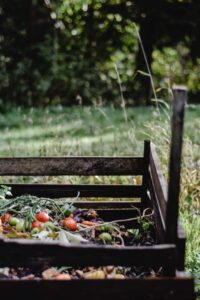Composting is a great way to save money, reduce your household waste, and create amazing soil for your garden! In this post I will go over the basics of composting. How to do it, what to compost, and what not to compost.

Disclaimer: This page contains affiliate links. If you choose to make a purchase after clicking a link, I may receive a commission at no additional cost to you.
Why Compost?
First, let’s talk about why we should compost in the first place. There are lots of reasons why composting is a good idea for your family and for the environment as a whole.
- Reduce waste-composting is basically taking food that you were going to put in the trash and repurposing it. Instead of being thrown out, now you can use this food to create great soil. See my Zero Waste Swaps post for other great ways to reduce waste!
- Like I mentioned above, composting creates amazing, nutrient rich soil for your garden and plants. By mixing the right amounts of carbon rich and nitrogen rich ingredients, you will soon have great soil for years to come.
- By using free material to create this great soil, you are going to save a ton of money when it comes to gardening! Those little bags of soil at the hardware store can cost a fortune! But this method is essentially free and can be made year round.
- Composting is fun! My kids have fun looking for the worms in our soil and putting the fresh soil that they helped make out into our garden beds.
How to Compost
Now that we have talked about some of the great reasons why we should compost, let’s talk about how to actually make it happen. Composting is not hard and takes minimal effort on your part. Here are a few simple tips to make compost in no time.
- The cheapest way to compost is to find a spot in your garden where dogs or wild animals cannot get to and just dump the compost in a pile. But, if you do not have a good spot for that you can always get one of these cool compost bins.
- After you have figured out where your compost will go, start saving your kitchen scraps. I personally just keep them in a bowl in my sink and take them out every night. (see below about what to compost and what not to compost).
- After you fill your compost bin with about 4 inches of kitchen scraps, you will want to add the same amount of leaves. This is because you want to have a mix of carbon and nitrogen rich products in your compost. And continue to do this layering process until your bin is full.
- Every once in a while, (let’s say every time you add new leaves) you will want to turn your compost. If you are composting in an open spot in your garden, this can simply be done with a compost hook or with a shovel.
- If your compost area is not getting a lot of rain, you will also want to periodically add water.
- In a few months, you will have nutrient rich soil ready to use in your garden!
What to Compost
As you can see above, composting is super simple and does not take much time or effort. But, there are a few things you need to know in regard to what you can and cannot put in your compost for optimal soil. You want to make sure you are getting a nice balance of nitrogen rich and carbon rich products in your compost. If not, your plants will not grow well.
Nitrogen rich products include fruit and veggie scraps, coffee grounds, leaves, and grass clippings.
Carbon rich products include wood chips, leaves, hay, untreated paper and cardboard, and dryer lint.
Egg shells are also great for your soil and are considered neutral on the carbon-nitrogen scale.
A few things you want to make sure to not compost include cat and dog feces, bread, dairy, meat, cooking oils, citrus peels and onion peels. Unlike other fruit and veggie scraps, citrus peels and onion peels are very acidic and can cause more harm than good to your soil.
I hope you and your family have a great time creating nutrient dense soil for your garden for years to come!

[…] cleaned out the bin about once a week. If you compost, just put those pine shavings with the chicken poop right in your compost! Lay down a fresh layer […]
[…] Compost– 3-4 inches of organic manure (chicken, horse or cow) or organic matter compost (leaves, […]
[…] option you have chosen. Be sure to add in some leaves or grass clippings as you go. Check out my Compost Post to learn […]